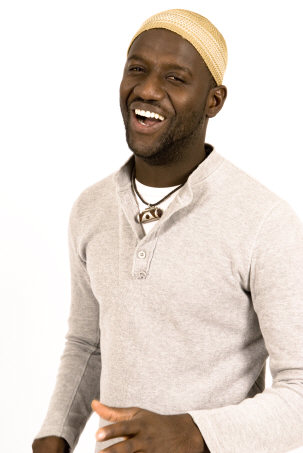| |
Although
Seckou was born in Senegal, he is a descendant of the Malian
Keita family of kings. Under normal circumstances his lineage
would not allow him to become a griot but he learned to play
the kora during
his up-bringing by his mother�s side of the family, the Cissokho�s,
a well-established griot family in Senegal. By the age of 7
years Seckou was already performing at festivals in Senegal,
supporting his famous uncle Solo Cissokho. At 12 years old he
had formed his own group, Coute Diomboulou and was performing
all over the country.
In 1996 Seckou went to Scandinavia under
the guidance of his uncle Solo Cissokho, and performed at the
Forde festival with musicians from Norway, India and Cuba.
The group combined traditional music from
each of their countries to create a new musical style. The next
year they were at the Global Music Festival in India performing
with Dr L. Subbrimaniam, an internationally renowned violinist
and composer. The patriarch of the family, Solo Cissokho, first
mentioned a dream of their family uniting to carry on their
powerful tradition throughout the world, introduce it in its
modern form and to be called Jalikunda (the House of Griots).
Read on to see the vital part Seckou Keita is having in
fulfilling this dream ...
In 1998, Seckou relocated to Britain and
became a member of the fusion band Baka Beyond, touring all
over Europe (the Czech Republic, Spain, France, Portugal, Greece
and Britain) in festivals such as Womad and Glastonbury. Playing
either the kora or drums, he has been in great demand at drum
camps, private parties, weddings and first night openings of
musicals such as �The Lion King� in London�s Covent Garden.
Seckou�s first album Baiyo (meaning 'Orphan') was released
in 2001. This 9-track CD has recently been re-released under
the title Mali. On some tracks Seckou plays the kora
only and on others its beautiful sound is complemented
by the violin, mandolin, drums and vocals. Seckou composed the
song �Tamala� with thoughts of his sojourn from Africa to Europe
via India. A most enjoyable track, 'Sabu Nginna�, portrays the
luck Seckou has had in becoming a musician.
In 2001, Seckou impressed audiences as
a solo performer at Womad (Las Palmas)
and the Sacred Music Festival (Ireland).
During BBC Radio 3�s event �Africa Night�.
at the Jazz Café in London Seckou
played kora while Justin Vali from
Madagascar played the
valiha, forming
a great duo from across Africa. Following that Seckou was nominated
for the 2001 World Music Award by Radio 3's listeners.
Seckou
created the band Jamoral which
|

photo:
© Will
Wilkinson
was
the first step in modernising kora music with a groove dance
approach. The band took part in different festivals such as
Womad, the Edinburgh Festival and the Epicuriales (France).
Their recipe for success was a potent cocktail of spiritual
Afro-Mandinka music with a twist of jazz, inspired by the songs,
dances and rhythms of the lush area of Casamance in southern
Senegal where many members of the band come from. As a ten-piece
band, Jamoral is made up of two koras, bass, balafon, sabar,
djembé, bougarabou, doun-doun and two voices. Jamoral
can also be an acoustic four-piece band. Whether a four-piece
or a ten-piece band, their power draws on the deep roots of
traditional African percussion, dance and song resulting in
a dynamic and inspirational blend. Having had such a positive
response at major festivals and also smaller events, the members
of Jamoral decided to join up with Jalikunda.
In 2002, Seckou invited 4 members of his
family to tour all over UK in renowned festivals in the band
Jalikunda. Their first family album Lindiane was released
in 2003 and they were also very busy touring.
Next, in 2004 Seckou formed a multi-national
band, Seckou Keita Quartet, or SKQ. The members are: double
bass/electric bass player Davide Mantovani, the eclectic percussions
of Surahata Susso, the distinguished sound of the violin by
Samy Bishai and the enchanting voice of Binta Susso - the newest
addition to the band, who turns the quartet into a quintet!
Their CDs are Afro
Mandinka Soul...Tama Silo
(2006) and The
Silimbo Passage (2008). SKQ are constantly on tour all
over the world, e.g. in 2008 at Zanzibar's Sauti za Busara festival
in February, opening for Miriam Makeba at Brighton Festival,
the Guardian Hay Festival and
the Jazz Café
in London to name but a few.
More information
is on Sekou's own charmingly designed website: www.sekoukeita.com
|
![]()